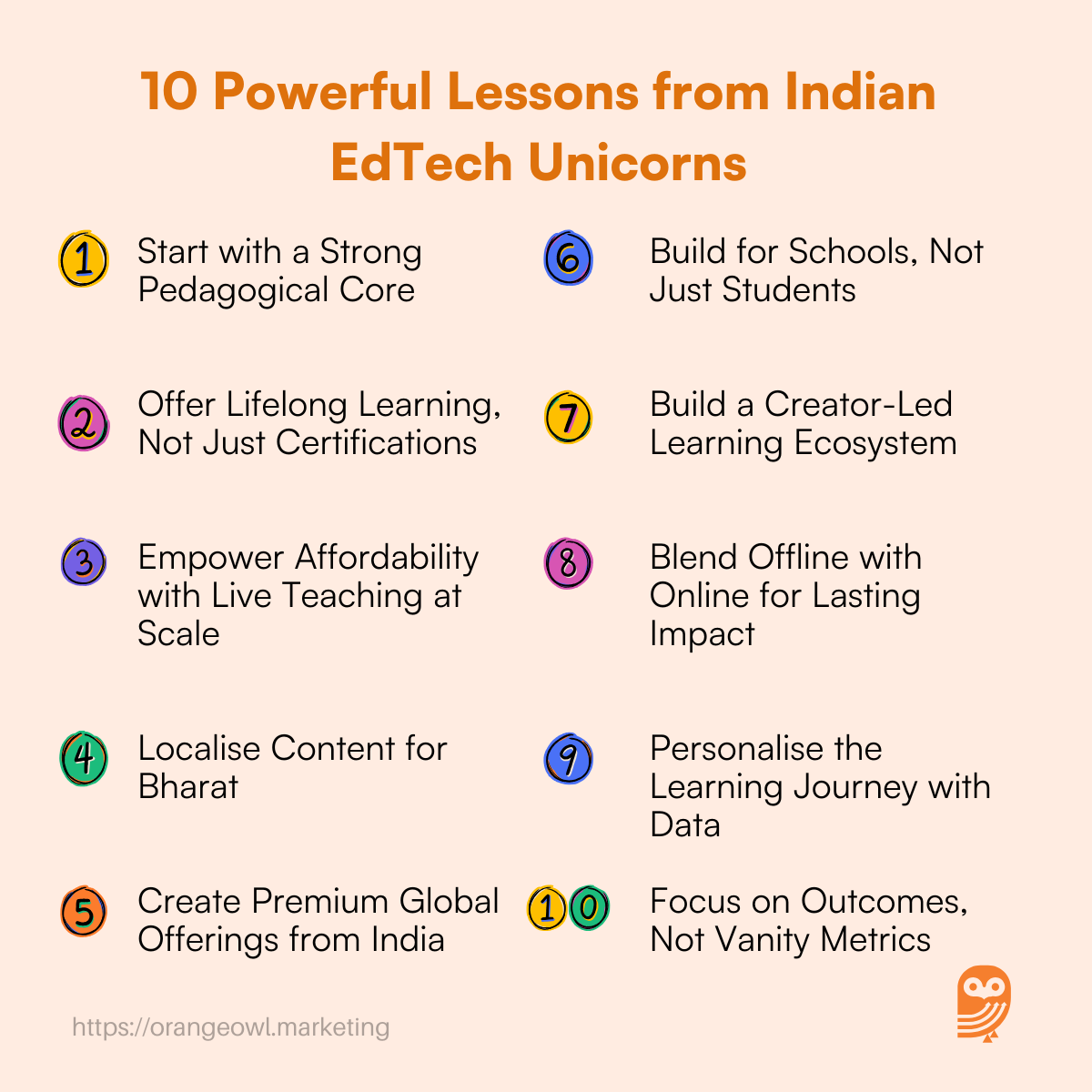10 Impactful Lessons from Indian EdTech Unicorns
Vivek Goel
June 10, 2025

Table of Contents
Introduction
India’s EdTech unicorns have redefined how learning is accessed, delivered, and experienced across the country. These companies are not just digital extensions of traditional classrooms—they are education reimagined through technology, built to solve deep-rooted inefficiencies and democratise learning for millions. Whether by enabling affordable test prep, bringing Ivy League education to Indian homes, or skilling the workforce for the future, these startups are transforming how India learns.
Operating in a space shaped by diverse languages, income disparities, and limited infrastructure, these unicorns have tackled immense challenges with bold innovations—from adaptive learning algorithms to immersive hybrid models. Their stories provide sharp insights into scaling impact, building student trust, and evolving business models in a hyper-competitive space.
In this post, we draw lessons from Indian EdTech unicorns—BYJU’S, upGrad, Vedantu, Physics Wallah, Eruditus, LEAD School, and Unacademy—each of which showcases a unique strategy to lead in the world’s most dynamic education market.
1. Start with a Strong Pedagogical Core — BYJU’S
BYJU’S didn’t begin as just another test prep company—it evolved from a live classroom brand built around Byju Raveendran’s unique teaching style. As it scaled digitally, the company retained its student-first approach, ensuring high-quality pedagogy remained central. Their success shows that flashy tech won’t stick unless it’s built around genuine learning outcomes.
Key Lesson: In EdTech, pedagogy is the product. To build trust at scale, start with excellent content, strong outcomes, and iterate with student success as the core metric.
2. Offer Lifelong Learning, Not Just Certifications — upGrad
upGrad focused on skilling India’s workforce—bridging the gap between academic qualifications and industry needs. Its partnerships with universities and corporations enabled it to build career-centric programs, serving professionals across industries and age groups. Their model extended EdTech beyond school and test prep into a lifetime learning companion.
Key Lesson: Don’t limit the vision to exam prep—create lifelong value by aligning with evolving industry demands, and you’ll build deeper customer relationships.
3. Empower Affordability with Live Teaching at Scale — Vedantu
Vedantu pioneered live, interactive online classrooms, offering affordable access to top teachers for India’s K–12 students. Its WAVE platform used real-time engagement tools to simulate classroom-like energy at scale, giving students both affordability and accountability. This model proved that live education could be high-quality and mass-market.
Key Lesson: Real-time, live interaction builds trust and retention, especially in price-sensitive markets. Make technology human, not just automated.
4. Localise Content for Bharat — Physics Wallah
Physics Wallah’s meteoric rise came from a simple yet powerful strategy—serve Bharat, not just India. By offering high-quality video content in Hindi and regional languages at extremely affordable prices, PW won over Tier 2 and Tier 3 students across the country. Their success wasn’t driven by tech but by deep empathy for student needs.
Key Lesson: Regional content, affordability, and a student-first ethos can unlock massive scale in underserved markets. Solve real pain points before chasing innovation.
5. Create Premium Global Offerings from India — Eruditus
Eruditus took a contrarian path—building a premium global EdTech brand from India in partnership with top-tier universities like Harvard and MIT. They leveraged tech to democratize Ivy League access globally, with local pricing and flexible formats. Their hybrid executive education model blurred the lines between traditional and online learning.
Key Lesson: Indian EdTech doesn’t have to be India-only. With smart partnerships and premium positioning, global scale is achievable without compromising accessibility.

6. Build for Schools, Not Just Students — LEAD School
LEAD School focused on transforming schools from within, offering an integrated solution combining curriculum, teacher training, tech platforms, and assessments. By serving budget private schools, LEAD tapped into a high-volume, under-digitised segment and became a crucial infrastructure player in India’s education system.
Key Lesson: Selling to schools—if done well—can be a powerful moat. Build complete ecosystems, not just apps, and you’ll create real systemic change.
7. Build a Creator-Led Learning Ecosystem — Unacademy
Unacademy’s community-first approach—empowering top educators to teach and monetise via its platform—helped it scale rapidly across competitive exam segments. The brand’s influencer-led strategy, including acquisitions like PrepLadder and partnerships with exam toppers, turned it into a creator-powered knowledge network.
Key Lesson: In a content-heavy space like EdTech, creators are your biggest asset. Build tools that empower them, and you build scale and trust together.
8. Blend Offline with Online for Lasting Impact
As EdTech matured post-COVID, most unicorns, including BYJU’S, Vedantu, and Unacademy, began investing in offline learning centres. These hybrid models acknowledge the emotional and logistical importance of physical spaces, especially in competitive exam prep and early education. It also builds deeper retention and community.
Key Lesson: Hybrid is here to stay. Combine digital convenience with physical presence to deepen impact and diversify business models.
9. Personalise the Learning Journey with Data
Platforms like Physics Wallah, upGrad, and LEAD have used data-driven insights to personalise learning experiences—whether it’s adaptive assessments, personalised feedback, or performance nudges. Personalisation helps students stay engaged and, more importantly, get better outcomes.
Key Lesson: Leverage learning data to personalise the journey. What improves outcomes improves retention and business results.
10. Focus on Outcomes, Not Vanity Metrics
Across the board, these unicorns have learned that completion rates, student outcomes, and placements matter far more than downloads or DAUs. Companies like Eruditus and upGrad have doubled down on placement support, while LEAD and Vedantu track learning improvements as core KPIs.
Key Lesson: Shift focus from growth hacks to actual outcomes. When your success is tied to student success, trust and scale naturally follow.
Conclusion
India’s EdTech unicorns have done more than digitise education—they have redefined who gets to learn, how learning happens, and what impact education can truly have. Whether it’s Physics Wallah making IIT prep accessible to small-town students or Eruditus bringing Harvard to homes in Mumbai, these companies have shown that innovation, empathy, and execution can create a generational impact.
Their journeys offer rich, actionable lessons—from building for Bharat and scaling live classrooms, to creating hybrid models and global education platforms. If you’re building in the education space—or any mission-driven business—these stories are a blueprint for balancing impact and scale.
👉 Dive deeper into these inspiring EdTech stories at orangeowl.marketing/unicorn-chronicles


